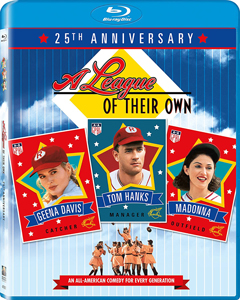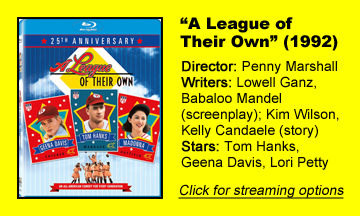“A League of Their Own” (1992), based in spirit if not specifics on the All-American Girls Professional Baseball League of the 1940s, is easy to pick apart once you give it some thought. But director Penny Marshall keeps the broad humor and luscious period detail coming at enough of a clip that the flaws don’t hurt it.
Ultimately, it’s a bittersweet slice of a time that truly existed and bizarrely – for reasons the film doesn’t address, adding to the poignancy – has never returned: the mainstreaming of women’s baseball.
Lovable cliches
All the actors are on the same page in creating a family friendly movie with exaggerated portrayals and lovable clichés. Tom Hanks chews scenery in a good way as Rockford Peaches manager Jimmy Dugan, a paycheck-questing drunkard who introduces himself to his players with a urinal scene that rivals “The Naked Gun” and “Austin Powers.” Third baseman Doris (Rosie O’Donnell) suspects it’s a record for the longest pee.
Geena Davis is the film’s heart as catcher Dottie, an Oregon farm girl. Somehow the complaints from kid sister and pitcher Kit (“Tank Girl’s” Lori Petty) about how Dottie is better at everything don’t get annoying. Instead, they are endearingly predictable.
The Peaches roster is filled with Big Hollywood characters, from center fielder “All the Way” May (Madonna) to right fielder Evelyn (“Monk’s” Bitty Schram), who challenges Dugan’s now-oft-quoted notion that “there’s no crying in baseball.”
Jon Lovitz supplies broad laughs as a talent scout, and David Strathairn balances that out with gravity as the Peaches owner who thinks the AAGPBL could be more than a one-year experiment while many MLB players are at war. (Indeed, the league lasted from 1943-54.)
Appealing 1940s trappings
The 1943-ness of “A League of Their Own” is a big appeal, from the bus trips (all four teams are based in the upper Midwest) to the wool uniforms to the wooden grandstands to the ballgames themselves.
The quality of the sports scenes is above average: You know you’re watching staged action, without many wide shots of game movement, but it doesn’t take you out of the film. Everyone looks like a passable ballplayer.
Marshall – working from a screenplay by Lowell Ganz and Babaloo Mandell – stages the games with old-timey film staples such as the PA announcer who does play-by-play for the crowd that’s sitting right there watching it, and a heckler (“Girls can’t play ball! You might break a nail!”) who gets a ball “accidentally” thrown at him. (This movie includes a scary amount of baseballs whipped at short range.)
We’re told that the league is in financial trouble and likely won’t return next year, yet we see montages of newspapers with front-page headlines on the Racine-Rockford World Series. These contradictions give “League” a magical feel, where we think “Did this story really happen?”
Did it really happen?
The answer is yes and no. It’s likely there’s a superior movie to be made from this material, and certainly a more accurate one. For instance, there’s no hint in “League” that this game isn’t baseball, but in reality, the AAGPBL featured a hybrid of softball and baseball.
Rule changes each year brought the game closer to men’s baseball. But putting that in the film would make for a distracting side trip, and it’s much more romantic to think women were truly playing the national pastime. They should have been.
The movie’s inaccuracies and flaws don’t offend me. The story is too good, as everyone is so earnestly human. An off-field highlight comes when the Peaches hit a bar on a road trip.
May dances up a storm in the type of choreographed but irresistible sequence we’d see nowadays in “The Marvelous Mrs. Maisel,” while shy, slick-hitting second baseman Marla (Megan Cavanagh) comes out of her shell and sings to a guy she likes.
“League” tries for tear-jerking when Dugan has to deliver a telegram about a husband’s WWII death to a player. But what really strains the tear ducts is the framing mechanism.
A path not taken
Lynn Cartwright plays an easily recognizable older Dottie (red hair must be a godsend for casting directors when matching actresses), who reluctantly attends the Baseball Hall of Fame’s Women in Baseball exhibit in present-day 1992. In the end, she meets her old teammates.
As a topper, we see the real-life women playing a pickup game in Cooperstown, many of them retaining their natural batting stances and arms. Madonna’s “This Used to Be My Playground” strikes a sad note that is at first incongruous but ultimately effective: These women were pioneers for something that should by all rights have taken off, but which history has not been kind to.
In an era when men and women tennis players get equal pay, women’s baseball is almost nonexistent. That’s worthy of a downer tune and bittersweet tears.



